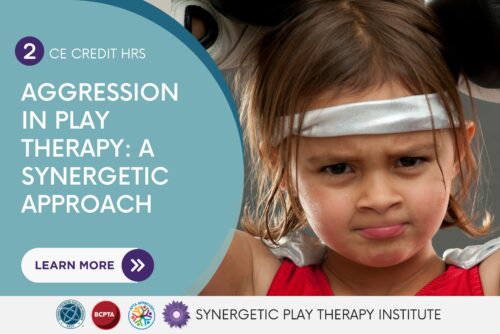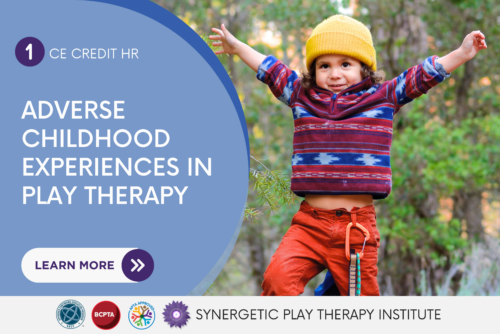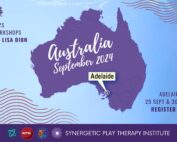-

 Adverse Childhood Experiences (ACES) can be a part of growing up. But how can we help turn these obstacles into opportunities for growth and resilience and apply this knowledge to the play therapy process? This course explores how play therapy can be used to help mitigate the effects of ACES. Learn the major categories of ACES, along with protective factors or strategies that have been shown to be helpful both in the short-term and long-term. This course is designed to enhance or increase the professional knowledge of graduate-level counselors.
Adverse Childhood Experiences (ACES) can be a part of growing up. But how can we help turn these obstacles into opportunities for growth and resilience and apply this knowledge to the play therapy process? This course explores how play therapy can be used to help mitigate the effects of ACES. Learn the major categories of ACES, along with protective factors or strategies that have been shown to be helpful both in the short-term and long-term. This course is designed to enhance or increase the professional knowledge of graduate-level counselors.
EARLY BIRD Registration Deadline is August 1st, Use coupon code "Adelaide50" at checkout for $50 USD off!
Final Registration Deadline is September 12th.
Lisa Dion is coming to Adelaide, Australia! Come join us for two unforgettable days of learning! During these two days, Lisa will teach a total of three topics adding up to 12 hours of transformative teaching! You will have the option to select to attend one or both workshop days to best fit your needs. Day 1 - "Playing Perfectly: A Play Therapist's Guide for Working with OCD" From perfectionism to anxiety to self-doubt, the world of a child struggling with OCD can be incredibly overwhelming. Come explore how to support these children in play therapy and discover how their need for perfection is in fact perfect! Supporting a child struggling with obsessive compulsions and perfectionism can be incredibly challenging as the desire to move the child out of their rigidity and rituals can overshadow the deeper issues and stressors driving the behaviors. Obsessive Compulsive Disorder is a complex disorder as the reasons behind the behaviors vary from managing anxiety to past traumas to focused energy inside of a child driving them towards their genius and that which is most meaningful. Due to the complexity, therapists often mis-label, mis-understand, and mis-guide these children in how to work with and understand their rituals and need for perfectionism. Without an understanding of this disorder and how play therapy is able to support the integration of the underlying drivers of the behaviors, play therapists can inadvertently intensify the inner struggle that is often experienced by these children as they attempt to stop, control and, even deny the urges in their bodies. Drawing from Synergetic Play Therapy® and interpersonal neurobiology, this workshop explores non-directive and directive play based interventions to help support play therapists on a path to understand the perfection in these children's perfection, while teaching the child how to do the same. Play therapists will take a deeper look at the regulatory function of the child’s behaviors that manage the internal conflicts and anxieties these children often carry. Through discussion and experiential exercises, play therapists will learn how to separate the underlying drivers from the wisdom of the rituals themselves. With this knowledge, play therapists will learn how to use themselves and many forms of play to help these children access an understanding of the greatest perfection that exists, the child just as they are! Day 2 Topic 1- "Developing Interoception: The Pre-req for Co-regulation and Self-Regulation in the Playroom" Helping children learn how to regulate is essential, but without first strengthening the child's interoceptive sense, regulation may not be successful. This experiential workshop offers various opportunities to explore how play can develop this fundamental part of the sensory system! As play therapists, there is an understanding that regulation and co-regulation are essential skills that must be developed in order to have successful relationships and manage emotions and are essential for trauma integration; however, what many play therapists may not fully understand is that there is a prerequisite that needs to be in place for regulation skills to be effective. What has been understood for years in the world of Occupational Therapy is now becoming a primary focus of education for play therapists. This important understanding is that the child’s interoceptive sense, the 8th sensory system that is responsible for letting the brain know how the body is doing, must be developed first before a child can successfully regulate and co-regulate. Without the development and strengthening of the interoceptive sense, a child may have all kinds of regulation knowledge and tools but will not be able to read their own body cues to know when to use them. Examples such as knowing when to use the bathroom, when to take a deep breath, when to ask for help, the ability to read non-verbal cues, knowing when emotions are feeling overwhelming, etc. all rely on interoception! This playful workshop is designed to help play therapists learn what the interoceptive sense is and how to use play to develop interoception in their child clients, setting the stage for successful regulation and co-regulation. Play therapists will have fun experientially exploring this fundamental part of the sensory system! Day 2 Topic 2 - "Mindfulness in Play Therapy" (with special guest Mindfulness Expert Peter Bliss!) Neuroscience is revealing that mindfulness is a key component for integration, so what is it, what is it not, and how do play therapists incorporate it into the playroom? These are important questions to consider! In this workshop, you will explore some of the neuroscience behind mindfulness as you learn how to cultivate it within yourself and within your child clients. You will also learn the importance of bringing mindfulness into the playroom as a way to avoid compassion fatigue, vicarious trauma, and burnout. This course is applicable to all play therapy theories! Please use the dropdown menu below to select your attendance option. You may choose to attend Day 1, Day 2, or both days for the full learning experience! *Please note that this is an entirely live, in-person event. Recordings of these workshops will not be made available.

